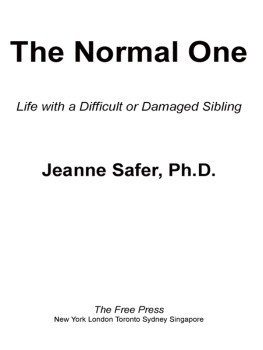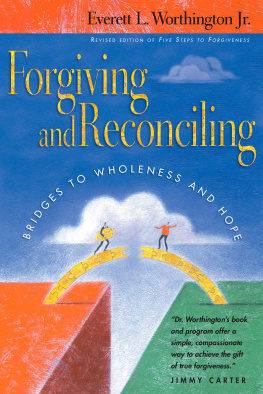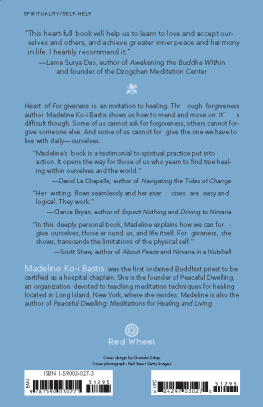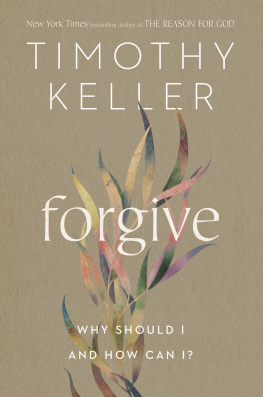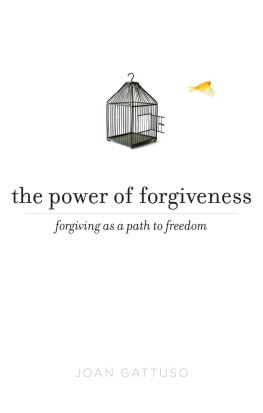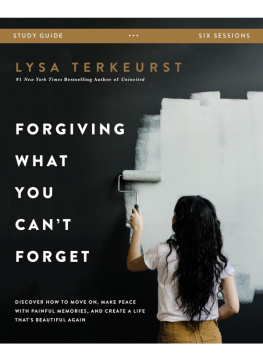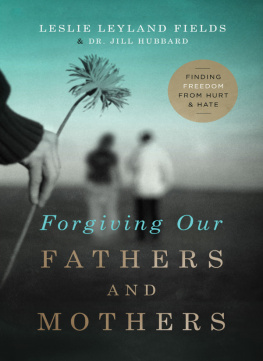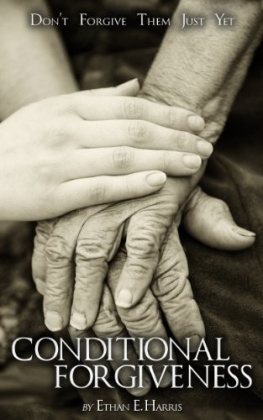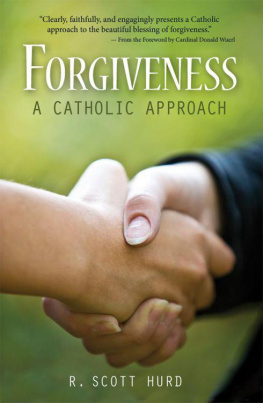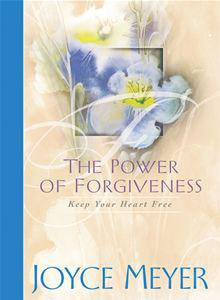F ORGIVING
& N OT
F ORGIVING
Why Sometimes Its
Better Not to Forgive
Jeanne Safer, Ph.D.

For Rick

Suddenly through the window was heard the sweetest of songs. It was the little living nightingale that was sitting on a branch outside. She had heard of her Emperors distress, and had come to bring him the hope and comfort of her song.
You heavenly little bird, I know full well who you are. It was you I banished from my Empire, and yet your song has chased the evil visions from my bed, and driven Death from my heart. How can I reward you?
You have rewarded me; tears came to your eyes when I sang to you; I shall never forget what that meant to me. In the evening I will sing so that you may be glad and also thoughtful. I will sing about the good and evil around you which are kept hidden from you.
Hans Christian Andersen, The Nightingale
Contents
A 20/20 segment broadcast in early January: As the uplifting music swells, the avuncular announcer intones And now heres a resolution for the New Year we should all makeforgiveness. We see a mother and daughter estranged for years kiss and make up, a couple after just a few sessions of forgiveness therapy (all previous marriage counseling had failed) holding hands and renewing their vows. Amid the gauzy backgrounds, the inevitable tears flow, the inevitable hugs proliferate, and the inevitable psychological experts stop just short of claiming that failure to forgive causes cancer and heart disease. They say traditional psychotherapy has neglected this essential element of cure and that studies show that forgiving alleviates depression and enhances self-esteem.
Several weeks later, on Good Morning America: A rabbi asserts that forgiving is like taking a poison out of your body, and a priest agrees that, otherwise, evil is recycled.
Politicians caught in scandalous behavior make public displays of contrition and speak poignantly of how their ordeals have taught them the importance of not only asking forgiveness, but of granting it to their accusers.
Whats wrong with this picture?
All the hype is not entirely inaccurate. We all know people (often in our own families) who havent spoken to one another for so long that they have forgotten what they were angry about, couples whose mutual resentments are etched on their faces, acquaintances so obsessed with hating or plotting revenge on their enemies that they have alienated us. I have treated many patients like them in my twenty-five years as a psychotherapist. But dont we also know othersmature, even wise peoplewho passionately refuse to forgive wrongs, or who feel, despite their best efforts, that they cannot without doing violence to themselves? Has failure to forgive destroyed their ability to love?
Forgiving and Not Forgiving proposes a paradigm shift. It challenges the conventional wisdom and offers a new and consoling perspective: that forgiveness as it is commonly understood is only one of many routes to resolution, humanity, and peace, and that reengaging with the past is the best way to change the future. It charges that false forgiveness damages self and society, and that not forgiving without vindictiveness can be morally and emotionally right.
The capacity to forgive is an essential part of an examined life. However, enshrining universal forgiveness as a panacea, a requirement, or the only moral choice, is rigid, simplistic, and even pernicious. Forgiveness by the numbers leads too frequently to emotional inauthenticitya condition rampant in contemporary America.
Everybody has something to forgiveparents who failed, lovers who left, friends who deceived, andoften the hardest of allour own actions. (Crimes by strangers are not intimate betrayals because they do not violate a personal relationship with the victim and will not be considered here.) Though it is a cornerstone of the Judeo-Christian tradition, forgiveness is not natural, or religion and society would not have to lobby so hard to get people to do it; the reflexive reaction to being hurt is hatred, outrage, and the desire for revenge. While forgiveness is not always necessary or possible, coming to terms with intimate betrayal is, and that is what this book is about.
Forgiving is as charged and protean a concept as love, as deeply personal, and as impossible to create by will, so there are no instructions here, only reflections and illustrations.
The book begins with my own story. My interest in forgiveness grew out of my personal battle with it, as well as my professional experience as a psychotherapist. I have spent the past twenty years resolving my relationship with my father, who betrayed me in a shocking way when I was a teenager, and from whom I was bitterly estranged when he died. The process, which I understand only in retrospect, has led to dramatic changes in the way I see the world, and myself.
You will also meet an extraordinary array of people in the course of the bookincluding a murderer, a princess, and my next-door neighborwho tell how they forgave or why they did not. Young and old, straight and gay, these fifty men and women struggled with betrayals ranging from the minor hurts of everyday life to terrible suffering at the hands of people they needed and trusted. Some of them made conscious decisions that they resolutely carried out, some agonized for years over whether to forgive, and some, for excellent or dubious reasons, refused to try. They describe their coming to terms in rare and intimate detail. Because forgiveness stirs such intense and often surprising emotions, my conversations with them were powerfully moving; I saw one of my dearest friends cry for the first time in the fifteen years I have known her.
When should we try to forgive or refuse to do so? What are the differences in forgiving the living and the dead, relatives and others, the repentant and the remorseless? Do attitudes about forgiving change through the life cycle? Can forgiving be willed? And is it true, in the words of Mme de Stael, that to understand all is to forgive all? Forgiving and Not Forgiving, grounded in the insights of contemporary psychoanalytic psychotherapy, provides a new take on these questions, which until recently were primarily the province of religion and moral philosophy. Now the topic has been commandeered by the self-help movement and by psychologists who have a covertly religious agenda. Most of these ignore or reject the critical role that unconscious thoughts and feelings play in forgivenessa role that must not be underestimated. Forgiveness has been cheapened by overuse until it has almost lost its meaning. I want to restore it.
In writing this book, I discovered that forgiveness encompasses many basic human concernsgrief, rage, ambivalence, remorse, and helplessness among them. The act is full of paradox; the most archetypal Christian act of forgiveness I encountered was by a nonbelieving Jew. Since people define identical experiences as forgiveness or unforgiveness, depending on their personal interpretation, no one outcome can be recommended for everyone.
I was also struck by how many people, including a number who did not consider themselves religious, felt guilty or even tortured about not having forgiven significant figures in their lives, particularly family members; I feel what only the evil feel, said a woman who could not love and never mourned for her hateful mother. Many were warned by friends, clergy, or therapists that their failure to forgive would blight their lives, or lead to depression or unbearable regret. This assumption demonstrates how deeply ingrained, without regard for individual needs or circumstances, forgiveness is as an ideal and as an imperative in our culture.


